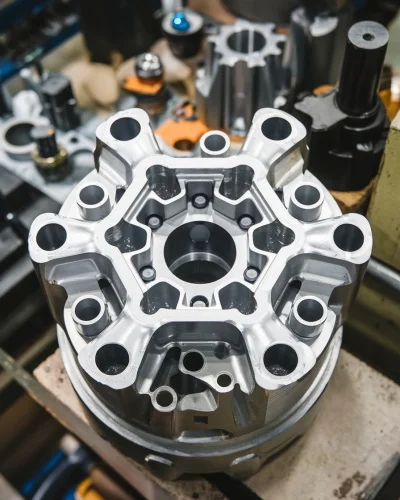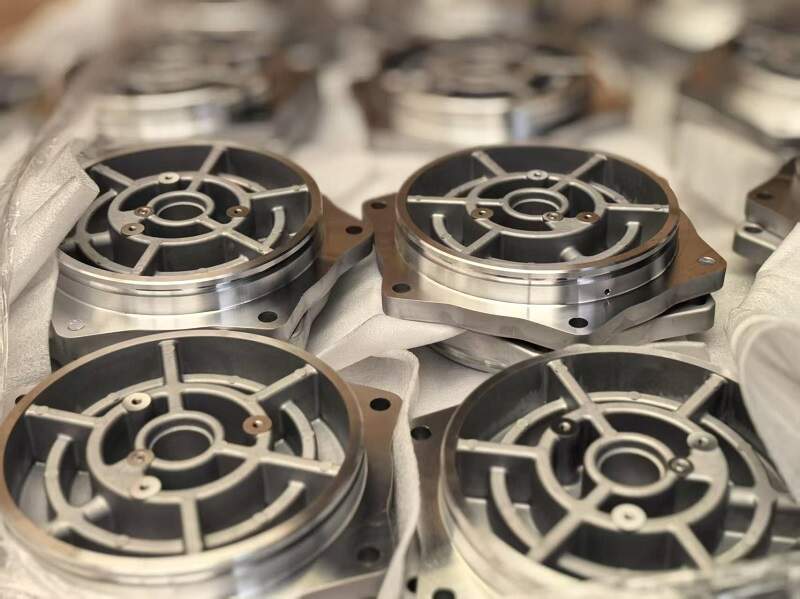Why Precision aluminum casting is ideal for lightweight metal solutions
Wiki Article
The Future of Light Weight Aluminum Foundries: Trends and Technologies Shaping the Sector
The aluminum factory sector is undergoing considerable makeover. Key trends highlight the importance of sustainability and effectiveness. Technologies in smart manufacturing and automation are ending up being widespread. Shops are significantly focused on utilizing recycled materials. This change questions concerning future techniques and technologies. How will these modifications effect manufacturing approaches and market characteristics? The answers may redefine the industry landscape in unforeseen methods.Innovations in Smart Production Technologies
As the light weight aluminum foundry market progresses, improvements in smart manufacturing technologies are ending up being increasingly crucial for boosting performance and performance. The assimilation of automation, artificial intelligence, and the Net of Points (IoT) is changing standard factory operations. These technologies enable real-time tracking of processes, permitting prompt changes that enhance outcome and lower waste.Equipment understanding algorithms analyze production information to recognize patterns and anticipate upkeep requirements, reducing downtime. Robotics are progressively utilized for repetitive jobs, releasing proficient workers to concentrate on even more intricate challenges. Additionally, digital twins-- digital designs of physical procedures-- facilitate simulations that can enhance design and operational strategies.
The fostering of these clever manufacturing modern technologies is driving affordable advantages in the aluminum shop industry. By enhancing workflows and improving decision-making capabilities, shops can meet expanding market needs while maintaining high-quality requirements. The future of light weight aluminum shops is without a doubt linked to these technological technologies.
Accepting Eco-Friendly Products and Processes
The light weight aluminum foundry market is significantly focusing on green materials and processes to improve sustainability. This change includes the fostering of lasting product sourcing, energy-efficient manufacturing techniques, and reliable recycling and waste monitoring techniques. By incorporating these techniques, shops intend to lower their ecological influence while maintaining competition in the marketplace.Sustainable Material Sourcing
How can aluminum shops boost their sustainability efforts? Sustainable material sourcing has emerged as a crucial method in attaining this objective. By focusing on recycled light weight aluminum, factories can substantially lower their environmental footprint, as recycled products call for much less energy and fewer sources compared to main aluminum manufacturing. On top of that, sourcing materials from certified distributors that abide by environmentally friendly practices advertises accountable mining and reduces ecological influence. Foundries are additionally checking out alternate products, such as biopolymers and green coverings, to complement traditional light weight aluminum procedures. Collaborating with stakeholders, consisting of vendors and environmental companies, fosters development in sourcing techniques. Inevitably, accepting sustainable product sourcing not only straightens with worldwide sustainability goals yet likewise placements aluminum shops as leaders in ecologically liable manufacturing.Energy-Efficient Manufacturing Techniques
Aluminum shops are progressively taking on energy-efficient production methods to enhance their sustainable product sourcing initiatives. These techniques concentrate on reducing power consumption throughout the production process. Advanced innovations, such as induction melting and maximized casting processes, are being applied to reduce the total carbon impact. Additionally, automation and wise production systems boost operational effectiveness, permitting for much better power monitoring. Factories are additionally discovering the assimilation of renewable energy sources, such as solar and wind, to power their procedures. By focusing on power performance, aluminum foundries not only lower production costs however likewise straighten themselves with international sustainability objectives, ensuring a more environmentally liable technique to light weight aluminum production while fulfilling the climbing demand for green techniques in the industry.Recycling and Waste Management
Embracing environmentally friendly materials and processes, light weight aluminum shops are focusing on recycling and waste administration methods to boost sustainability in their operations. By integrating closed-loop systems, these centers are lessening waste and taking full advantage of resource efficiency. Scrap light weight aluminum, a conveniently offered product, is being recycled on-site, greatly reducing the demand for virgin materials and lowering power usage. Advancements in arranging and processing innovations further facilitate the recycling of light weight aluminum, making sure that even infected products can be repurposed properly. Furthermore, foundries are taking on sustainable techniques such as minimizing dangerous waste and advertising making use of eco-friendly products for product packaging. This dedication to recycling not only reduces ecological impact yet also boosts the economic stability of aluminum foundries in an open market.The Role of Automation and Robotics
Automation and robotics are progressively transforming the aluminum shop industry, substantially boosting production performance. By integrating sophisticated modern technologies, foundries can minimize labor prices while at the same time improving safety and security requirements for their labor force. This shift not only enhances procedures but likewise positions the sector for lasting growth in an open market.Improved Production Effectiveness
Transforming manufacturing procedures, the assimilation of innovative robotics and automation innovations has become a foundation for aluminum shops looking for boosted performance. These developments streamline process, minimize cycle times, and boost item top quality by decreasing human mistake. Automated systems can check assembly line in real-time, permitting instant modifications that optimize output. Furthermore, robotics facilitate the handling of hazardous products, ensuring safer working environments while raising throughput. Anticipating maintenance innovations also add to efficiency by anticipating tools failures, thus reducing downtime. Consequently, aluminum factories can accomplish greater uniformity in their products while responding more promptly to market demands. This welcome of automation is establishing a new criterion for efficiency and functional quality within the industry.
Lowering Labor Expenses
The change in the direction of progressed robotics and automation in aluminum shops not just boosts production performance however likewise plays a significant duty in reducing labor prices. By integrating automated systems, factories can minimize the dependence on hands-on labor, which often includes high wages and training costs. Robotics streamline recurring jobs such as pouring, molding, and ending up, permitting for a greater output with less personnel. This technological modification not just reduces labor-related expenses but also improves uniformity and high quality in aluminum casting manufacturing. Moreover, automation can operate around the clock, making best use of functional hours without the connected costs of overtime or change differentials. As a result, light weight aluminum shops can achieve significant cost savings while keeping competitive pricing in a progressing market landscape.Improving Safety Criteria
While conventional light weight aluminum foundry procedures usually expose workers to harmful environments, the combination of robotics and automation considerably boosts safety criteria within the industry. Automated systems can perform high-risk jobs, such as molten metal handling and hefty lifting, decreasing human direct exposure to unsafe problems. Additionally, robotics can run in extreme temperature levels and poisonous environments, efficiently decreasing the danger of injury. Advanced keeping an eye on innovations and synthetic intelligence assurance real-time safety analyses, permitting prompt responses to possible threats. Automation streamlines process, decreasing the likelihood of mishaps caused by human mistake. Because of this, the adoption of these technologies not just enhances safety and security however additionally cultivates an extra reliable and effective workplace in aluminum foundries.Enhancing Energy Performance in Production
As aluminum shops seek to preserve competition in an advancing market, boosting energy effectiveness in manufacturing has emerged as an important focus. By taking on innovative technologies such as high-efficiency melting heaters and automated temperature controls, factories can especially decrease power consumption. Implementing real-time monitoring systems permits precise tracking of power use throughout the production procedure, allowing quick changes to maximize efficiency.Furthermore, moving to different power resources, including eco-friendly options, can further reduce the carbon footprint. The integration of power recuperation systems, which recover waste heat for reuse, is coming to be increasingly typical. Educating employees in energy monitoring techniques ensures that everybody involved in the production procedure bears in mind energy usage.
These initiatives not only lower operational prices but also line up with worldwide sustainability objectives, placing aluminum factories as liable gamers in the industry while improving their overall competition. - Aluminum Foundry
Innovations in Recycling Aluminum
Advancements in recycling aluminum have gained momentum along with initiatives to boost power performance in manufacturing. The light weight aluminum sector has actually embraced innovative innovations that improve the recycling process, minimizing power usage and environmental effect. Strategies such as hydrometallurgy and new sorting technologies improve the extraction of aluminum from scrap, improving yield prices and ensuring better recycled product.
The growth of closed-loop recycling systems enables factories to reuse aluminum without substantial destruction in high quality, making the procedure more sustainable. Developments in logistics and collection, consisting of boosted tracking systems and automated sorting, have additionally played an essential function in raising the performance of aluminum recuperation. These improvements not only add to a circular economy yet likewise help alleviate the carbon footprint linked with aluminum manufacturing. As the demand for lasting practices expands, these advancements position the light weight aluminum factory sector as a leader in liable resource monitoring.
Reacting To Market Demands and Customer Trends
Versatility has become a foundation for aluminum factories replying to advancing market demands and customer patterns. As sectors significantly prioritize sustainability, light weight aluminum foundries are moving in the direction of green practices, consisting of boosted recycling procedures and decreased carbon footprints. This change aligns with consumer choices for environmentally accountable products, driving factories to introduce their offerings.Furthermore, the rise of light-weight materials in aerospace and automotive sectors requires advancements in aluminum alloys and casting techniques. Foundries are purchasing research study and advancement to create high-strength, light-weight elements that satisfy rigid efficiency requirements.
Moreover, customization has acquired traction, with consumers seeking customized remedies. Light weight aluminum shops are leveraging sophisticated manufacturing innovations, such as 3D printing, to accommodate specific customer needs efficiently. This responsiveness not just pleases customer needs but additionally positions aluminum factories competitively in a dynamic market landscape, ensuring their relevance in an ever-changing industrial setting.

Regularly Asked Questions
Exactly How Do Light Weight Aluminum Foundries Impact Local Economies?
Aluminum shops substantially affect local economic situations by creating tasks, boosting need for local vendors, and adding to community development. Their procedures commonly lead to increased tax obligation earnings, which can fund necessary public solutions and facilities renovations.What Are the Safety And Security Rules for Light Weight Aluminum Shop Employees?
Safety policies for aluminum foundry workers include required individual safety devices, proper air flow systems, normal training on unsafe products, and adherence to standards set by work-related health and wellness administrations to lessen dangers and assurance employee safety and security. - aluminum castingHow Does Aluminum Recycling Affect Global Supply Chains?
Light weight aluminum recycling considerably reduces need for basic materials, boosts source performance, and stabilizes rates. This change impacts international supply chains by cultivating a circular economy, advertising sustainability, and making certain a much more resilient sector in changing markets.What Profession Opportunities Exist in the Light Weight Aluminum Factory Industry?
Various job chances exist in the aluminum foundry sector, consisting of functions in engineering, quality assurance, manufacturing administration, and r & d. Experienced labor placements such as mold makers and equipment operators are also popular.How Do International Profession Plans Influence Aluminum Foundries?
International trade plans significantly influence aluminum factories by affecting import tariffs, supply chain characteristics, and market gain access to. These variables can influence functional prices, competitiveness, and general success within the international aluminum production landscape.By prioritizing recycled aluminum, shops can substantially decrease their environmental impact, as recycled products call for less energy and fewer sources contrasted to primary light weight aluminum manufacturing. Aluminum foundries are progressively taking on energy-efficient production techniques to match their lasting product sourcing initiatives. Automation and robotics are progressively transforming the aluminum shop industry, considerably improving production effectiveness. The change in the direction of progressed robotics and automation in light weight aluminum shops not just enhances manufacturing efficiency but also plays a considerable function in minimizing labor prices. As light weight aluminum shops look for to preserve competition in an advancing market, enhancing energy effectiveness in manufacturing has emerged as an essential emphasis.
Report this wiki page